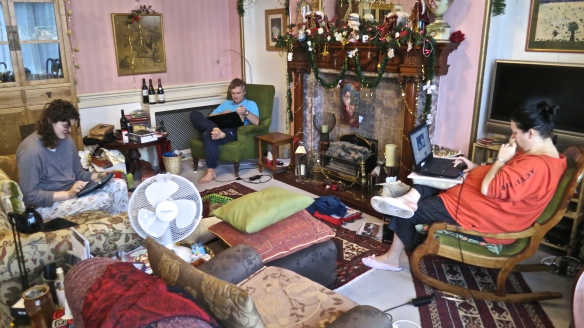This morning, Jackie drove me to New Milton where I caught the London train. It is the first week of the Wimbledon tennis tournament. Naturally the train was to have an additional stop at Wimbledon. Naturally it was a little late. Naturally it contained only four coaches. Naturally one of those was designated First Class. Naturally the other carriages were crowded.
As an introduction to to Cicero’s ‘In Catilanum’ I-IV, D.H.Berry’s article on ‘The Catiline Conspiracy’ which I read today offers a clear account of this event and Cicero’s action in opposing it. We are also told that Cicero’s speeches ‘Against Catiline’, which I went on to read, were published three years after the happenings that took place during the great orator’s consulship. This is significant because, although presented by the author as what he had said at the time, they may be construed as a later defence of his position.
Cicero was responsible for implementing the senate’s decision to execute the five captured conspirators without trial. This was not legal. The consul’s action, although praised at the time – he was honoured as the saviour of Rome – was ultimately to lead to his death in dishonour.
The four speeches deal, in order, with his exhorting Catiline to leave Rome; with warning the senate that the rebel was gathering his armies against the state; with the capture of those criminals left by their leader to act in the capital when the time came;and with the execution debate.
There were many such events in Roman history. What makes this one unique is that it occurred during the time of a man with the ability to sniff it out, to combat it so eloquently, and to write it up so cleverly to preserve the story for posterity.
From Waterloo I travelled by my now customary underground route to Preston Road, and a short walk to Norman’s. In the recreation ground through which I pass, I noticed two patient carers helping a severely disabled young woman prepare her headgear, presumably as a protection against the strong sun. They passed me on their way to the enclosure where I had seen Yaw practising his footballing skills on 19th March. I greeted them. The carers returned the greeting. The young woman took that as an invitation to sit on the bench I was occupying. With good humour she was persuaded otherwise.
The carers then began a game of catch with their charge inside the fenced off area. They were encouraging when she managed the task of grasping the basket ball, and all three seemed genuinely to be enjoying themselves. I realised that the younger person seemed without the power of speech.
I did not think it appropriate to produce my camera.
The Roman orator employed his considerable skills more than two thousand years ago. He used them to climb to a position of great power. Ultimately they caused his violent death. His name and influence have been valued throughout the world, and down the centuries.
Today’s nameless young lady will have a very different life. May it, and its ending be happier than that of the man whose name will be forever remembered.
For lunch my friend provided an excellent beef casserole with mashed potato and vegetables followed by juicy summer pudding with which we shared a superb bottle of Chateauneuf du Pape 2012. I then took the tube from Preston Road to Westminster via Finchley Road and walked on to Carol’s. From there I took my usual transport back to New Milton where Jackie was waiting to drive me home.
Category: Books
My reading, including illustrations
Latin Gave Me Up
Although not having got round its baffle, the crow is back trampling the petunias on the chimney pot. The squirrel, on the other hand, earned a meal this morning. It made a successful launch from the eucalyptus, crash landed on top of the corvine baffle, slipped underneath it, and scoffed away. Given that the rodent has now rivalled Eddie the Eagle, Jackie moved the feeder further from the tree. The next lift-off point will doubtless be the new arch. Google can supply further information both on our aforementioned Olympic skier and yesterday’s Greg Rutherford reference.
We returned, briefly, to Castle Malwood Lodge this morning to retrieve two garden recliners we had left behind; and for a chat with Mo. Jackie then drove us to Ringwood where I deposited two pairs of shoes for repair; back home for lunch; then on to New Milton for me to catch the London train to visit Carol.
The corner around our old flat is well stocked with self-seeded blooms from Jackie’s temporary garden; and

the little meadow alongside New Milton station has an abundance of wild flowers.

Today I finished reading Cicero’s ‘Pro Roscio Amerino’ (For Roscius of Ameria). This is an eloquent and subtle defence of a man facing a trumped-up charge of parricide, and is significant for its being the young advocate’s first speech in a criminal court, and for his courage in taking on powerful political elements. No doubt aided by D.H.Berry’s able translation, the writing flows, and is very readable and entertaining.
It is to be inferred from my last sentence that I did not read this in the original, which would have been far beyond me. I am no Latin scholar, as was proven by my first three years at Wimbledon College. My Grammar school was then notable for its emphasis on the classics. Keen to obtain as many OxBridge university places as possible, Latin and Greek were the school’s most valued subjects, for in those 1950s days, a Latin qualification was a requirement for entry into our two leading centres of learning.
I was never subjected to Greek, and my Latin was so abysmal that, long before the O level stage, I was transferred to Geography, not then considered of prime importance.
Being top of the class in French, it was always a mystery to me that I could not grasp Latin. At school, I thought maybe it was because it seemed to be all about wars that didn’t particularly interest me. Not very many years ago, I twigged the reason for the imbalance. It was partially about word order, but more significantly about ignorance of grammatical terms. Without understanding these, I could manage the modern language, not that dissimilar in construction to our own. Meeting concepts like ‘subjunctive’ which were not considered needing explanation for passers of the eleven plus exam, I didn’t just swim, I sank.
Latin gave me up. And Geography teaching was hit and miss, so I failed that too.
So. In English. I went on to read ‘In Verrem 1’ (Against Verres). This was a necessarily short piece used as a device to circumvent the delaying tactics of the defence of a patently guilty man. It was so successful that Verres withdrew and further prepared speeches were not required.
Each of the Orations in my Folio Society edition is preceded by a helpful introduction by the translator. I began Berry’s piece on ‘The Catilinarian Conspiracy’.

From Waterloo I walked across Westminster Bridge to Carol’s in Rochester Row. I have seen this route even more crowded than today, but it was still a struggle to reach and walk across the bridge and past the Houses of Parliament and Westminster Abbey.

At the junction of Great Smith Street and Victoria Street a woman struggled with a chain of keys that would have done credit to Dickens’s Jacob Marley from ‘A Christmas Carol’, to free her bicycle from its fixture on a set of railings. Having succeeded, she dropped the cluster on the pavement and loaded her steed. Given her apparel and the content of her baskets, I wondered how she would manage to ride off. She didn’t. She donned her furry hat over the straw one, pushed the bike across the road, and continued down the street.
I took the 507 bus from Carol’s back to Waterloo and boarded the train to New Milton where my chauffeuse was waiting to drive me home; show me her planting and tidying of the garden; and feed me on fresh vegetables with beef casserole, the method of cooking of which is given in yesterday’s post. She drank Hoegaarden, and I abstained.
Hours In A Library
During the night I began to realise that, although ‘Monkey’ by Wu Ch’eng En was snuggled up in the novels section of the library, there was no Gibbon among the shelves that I thought had been accurately filled yesterday. That meant that there had to be another History container somewhere among the 24 left to empty. This morning’s search demonstrated no such luck.
There were two.
Consequently another couple of hours was spent moving books along and adjusting the heights of shelves. After lunch it was the turn of Biography. In searching for the first of those, I came across a third History box. It was well into the afternoon before I could tackle the stories of people’s lives.  These were all on their shelves soon after our evening meal which consisted of liver, bacon and sausage stew with roast potatoes, carrots and beans, followed by a chocolate eclair. All delicious. I drank via di Cavallo chianti 2012 then got back to finish the last of the biographies.
These were all on their shelves soon after our evening meal which consisted of liver, bacon and sausage stew with roast potatoes, carrots and beans, followed by a chocolate eclair. All delicious. I drank via di Cavallo chianti 2012 then got back to finish the last of the biographies.
 Over the past day or two I have spent so much time on the task of housing a lifetime’s book collection that I have often thought of Sir Leslie Stephen. Virginia Woolf took the name by which we know her from her husband Leonard. She was born a Stephen, her father being the eminent Victorian man of letters.
Over the past day or two I have spent so much time on the task of housing a lifetime’s book collection that I have often thought of Sir Leslie Stephen. Virginia Woolf took the name by which we know her from her husband Leonard. She was born a Stephen, her father being the eminent Victorian man of letters. 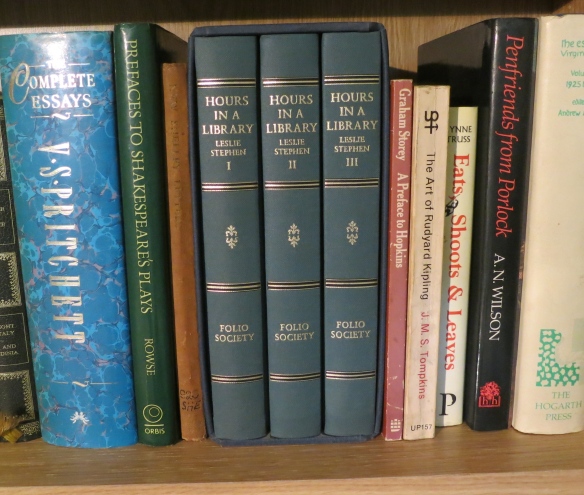 The reason he has come to mind is that the Folio Society edition of a selection of his writings is called ‘Hours in a Library’. I have spent many of these lately, but, I think, not quite in the way he did, which was in reading and writing. It seems a bit antisocial to hide away with a book, whereas sitting in company with one doesn’t to me.
The reason he has come to mind is that the Folio Society edition of a selection of his writings is called ‘Hours in a Library’. I have spent many of these lately, but, I think, not quite in the way he did, which was in reading and writing. It seems a bit antisocial to hide away with a book, whereas sitting in company with one doesn’t to me.
Stephen was the first editor of the Dictionary of National Biography, the first volume of which was published in 1885 by Smith, Elder & Co. This is a record of the lives of notable UK people that continues in regular supplements today. From 1917 it has been produced by the Oxford University Press. The original edition ran to 63 volumes, which are now reproduced on the same sheets by OUP, albeit on thinner paper with one third of the number of tomes.
I do have the complete set which we are going to need more bookshelves and organisational ingenuity for me to keep. So it will be off to IKEA tomorrow.
Some OUP publications supplement my 23 of the original nineteenth century issue. How I came by these is a story worth telling. Sam and Louisa, when they were both quite young, had been given the task of hiding these books, individually wrapped, around the house and garden. I had the job of following their clues, as in an Easter Egg hunt, each one leading to another. I wondered when the supply would run out and how many there would be. They were a birthday present from Jessica who had found them in a second hand bookshop in Lincolnshire. I have never discovered any more, although, much later, I did find odd copies of the modern edition, with which to complete the collection, in a shop on Marylebone Road.
A Good Read
Much of the day was spent continuing with the filling of the bookshelves. By the time we had finished last night we were both under the impression that we hadn’t been out that day. We’d both forgotten the mere four hours spent on the IKEA trip which we had in our minds relegated to the day before.
I can categorically state that we have not left the house today. We made a great deal of progress on the novels, but not as much as we at one time thought. When we completed the Novels M box we thought we were more than half way through this major section. I was somewhat perturbed at the shortage of Is. Surely I had more than one Hammond Innes and another Christopher Isherwood. The task is possibly numbing our brains a bit, so I didn’t persist. I should at least have wondered where John Irving had got to.
So….. With only the two aforementioned Is to separate Harris from Joyce, we continued merrily along through to M. Neither did it occur to us that there should be more Hs. What about Hemingway and Hoban?
Determined not to make the same error (you will by now have realised, as we did, that something was awry) with N, we searched and searched for it. That box remained elusive. What we did find, however, was H to J.
One of the beauties of the Billy bookcases is that the shelves are adjustable, so that different sized books can stand alongside each other in their correct alphabetical order. These can be adjusted as you go along. It is also helpful to leave a few gaps so that when inserting an additional volume or two there is enough room on the shelf without having to move everything along, and consequently risk having to readjust the height of the shelves ad infinitum.
If you have omitted a large section like H to J there is no way you have left enough spaces, so there is more pulling out of studs to lower or raise the laminated chipboard on which to perch the books. This is quite a laborious process, and if you haven’t estimated the space correctly, you have to do it over again. Having gone through this experience once, we had a determined effort to find N. The Novels N box was, of course, in the least accessible spot in a far corner surrounded by Reference, History, Philosophy, etc., etc. I got in and heaved it out.
Have I mentioned that when I first met her Jackie was a librarian? I thought not. Well, she was, and this is proving to be quite useful.
After lunch Jackie researched the Internet and found that the
unknown shrub near the bottle brush trees is a Chinese Lantern Tree or Crinodendron Hookerianum. I updated the relevant post.
We also have a beautiful magenta pieris and and a mature lace cap hydrangea.
Two more discoveries from the treasure trove of Safestore Storage boxes are a photograph and a drawing.
The photograph is a heat-sealed print on board. It is too large for my scanner, so I have here taken the image directly from the August 1971 colour slide. Michael is reading to Jackie and me at 76 Amity Grove.

Two years later I made this quick charcoal sketch of him reading to Matthew.
Late this afternoon Shelly dropped in for a visit and brought a few of the plants and garden ornaments we had left at her home.
Jackie and I dined on fish, chips, and mushy peas, followed by a Post House Mess, the ingredients for which are similar to a Firs Mess.
Twelfth Impression
This morning the building of the last two bookcases was completed.
I managed to unearth the Novels A box and cleared a path to begin placing books on the shelves.
That is when Jackie decided that the column of concrete in the left hand corner offended her eye. Worse than that, she had a half width set of shelves in the kitchen which she was prepared to sacrifice to cover it up.
Oh joy. That meant shifting many more boxes without Matthew’s muscle. The two bookcases Matthew had moved across the room would have to be moved along a foot or so. And he had screwed them together to make the structure more secure. So I had to unscrew them; with Jackie’s help, reposition them and the one from the kitchen; and fasten them up again. That should have done the trick.
But there was now a strip of exposed concrete along the top. As I contemplated filling it with paperbacks before she noticed, she covered it herself with a piece of flooring laminate that had been placed along the windowsill. She had cleaned it up and saved it in case it might come in useful.
Why did I have to choose Superwoman?
After lunch I did get to begin filling shelves with novels whose authors names begin with A to C. In doing so, I found my copy of Daisy Ashford’s ‘The Young Visiters’. On May 22nd 1919, the then thirty seven year old author published, for the first time, the acclaimed masterpiece written when she was nine years old. Such was the work’s amazing success that by July that same year the twelfth impression, one of which is my book, was published. This brilliant description of adults and their behaviour, with uncorrected spelling adding to its charm, has never been out of print.
This evening we dined on Jackie’s superb sausage and bacon casserole (recipe), served with mashed potato and crisp cauliflower and broccoli.
The Chicks Have Hatched
One of the consequences of moving house is the need to wonder where to put things. This is very helpful in encouraging one to complete unfinished organisational tasks begun years ago. In about 2008/9, when living in Sutherland Place, I discovered that some of my books and slide boxes had been damaged by damp. The colour slides themselves were sound, but the boxes were on the wet side, so new containers were essential. I bought some, and decanted the positive films from the worst of the moistened ones. Although I had enough new receptacles to take the contents of the last, least damaged, box, I didn’t finish the task until yesterday. All in the interests of reducing by one the number of containers needing a home.
This led me, this morning, to resuscitating the ‘posterity’ series. My first photo-shoot of Jackie was made on Wimbledon Common in April 1966.
Here is one of the pictures, with the War Memorial in the background top left.
Before this I walked the whole length of Shorefield Road and Sea Breeze Road, taking in the vast acreage of the Country Park. The high-pitched screeching of the gulls over the stubble field on
Downton Lane gave way to the deafening racket of the rookery, at times indistinguishable from that of a reversing Highway Maintenance vehicle.
The lofty nests of the frenetically active rooks are now apparenty occupied by ravenous chicks. The parents flap to and fro keeping their offspring from starving. Each rounded cluster of sticks is guarded by one adult whilst its mate energetically forages.
At the far end of the Sea Breeze section of the park, where building continues unabated, is a meandering stream-crossed woodland walk leading to Studland Common Nature Reserve. Although partly gravelled, the paths tend towards the muddy.
The ear tags of cattle grazing in Studland Meadow reflected the gorse around them.
On my return I met and conversed with two separate dog-walkers. I was quite relieved that the West Highland terrier poised for attack was on the end of a lead, and had probably already had his breakfast.
This afternoon, as promised, our chests of drawers were delivered by Fergusson’s House Clearance.
Before dinner I finished reading Nathaniel Hawthorne’s novel ‘The House of the Seven Gables’, in the Folio Society edition illustrated by Francis Mosley. First published in 1851 this is an intriguing story rich in characterisation. The author’s skill in story-telling surmounts the wordiness of some of his language commensurate with his time of writing. The reader’s interest is maintained throughout. There is a touch of mystery about both the house and the writer’s tale, and he ties it all up tidily in the end.
Mosley is a versatile illustrator who remains one of my favourite Folio Society artists.
Our evening meal was roast lamb in tasty gravy, served with crisp vegetables. I drank Cimarosa Chilean merlot from 2013.
All Part Of The Process
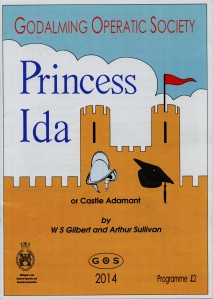 The annual O’Connell/Rivett family attendance at the Godalming Operatic Society’s Leatherhead Theatre production of a work by Gilbert & Sullivan directed by Pat O’Connell follows a carefully choreographed process. Taking advantage of the close proximity of each point in the proceedings, arriving in very good time to dine before the performance, we all stay at the Travel Lodge hotel in the town, walk around the corner to dine at an Italian restaurant, and across the road to the theatre. Afterwards we enjoy a drink in the company of the cast, spend the night at the staging post, and breakfast at Annie’s cafe before making our ways home.
The annual O’Connell/Rivett family attendance at the Godalming Operatic Society’s Leatherhead Theatre production of a work by Gilbert & Sullivan directed by Pat O’Connell follows a carefully choreographed process. Taking advantage of the close proximity of each point in the proceedings, arriving in very good time to dine before the performance, we all stay at the Travel Lodge hotel in the town, walk around the corner to dine at an Italian restaurant, and across the road to the theatre. Afterwards we enjoy a drink in the company of the cast, spend the night at the staging post, and breakfast at Annie’s cafe before making our ways home.
The outing was yesterday. The operetta Princess Ida.
All part of the process is that Helen and Bill will have parked in the more expensive car park a bit further away. Ron will then offer to go and collect their car and move it to the one that is free after 6 p.m. and over the weekend, about 100 yards away. He will do this just in time for us to take possession of our seats before the prompt start of the overture.
There is one popular restaurant near enough and willing to feed the entire cast and guests in good time to facilitate the promptness. This year, having changed ownership, it was undergoing refurbishment. It was not yet officially open, but the new proprietor offered to provide a restricted menu for us all, provided we placed our orders in advance. We did so. The orders were placed in a relay of mobile phones. This meant that there was some confusion about my pizza, but this was rectified with good humour. I am not sure what the original name of this establishment was. It is now Rialto, and is to be recommended. There were no complaints about the previous one, but all were agreed that this reincarnation is a general improvement. If they live up to their first night, they should do well.

There was, however, one part of the process that was maintained by the new staff. Traditionally, one of our group goes without something until the waiting staff are eventually alerted to its absence. It may be an entire meal, a drink, or simply a glass with which to imbibe a share of a bottle of wine. Until now, Shelly has been the victim of all these omissions. Perhaps it served me right for speculating about what she would miss out on last night, for it was I who went without my pizza. Drinking my share of the house red wine, I watched the others enjoying their various dishes accompanied by red or white wine. Eventually I got my own back, and they all watched me consume mine, which was excellent.
Perhaps it served me right for speculating about what she would miss out on last night, for it was I who went without my pizza. Drinking my share of the house red wine, I watched the others enjoying their various dishes accompanied by red or white wine. Eventually I got my own back, and they all watched me consume mine, which was excellent.
The Leatherhead Theatre is an excellent venue. This morning, during a wander around the town, I noticed it was occupied by a group engaged in a religious service of some denomination, so it is perhaps as versatile as the Regent Centre at Christchurch. I also noticed a plaque on the wall, part of the information provided by Leatherhead Heritage Trail, giving a history of the building:
The theatre was very full, as warranted by the usual accomplished performance. Familiar faces included Simon Cakebread, bravely surmounting a chest infection, as King Gama; Richard Arthur as King Hildebrand; and Richard Hales as Hilarion. The Society is fortunate in having a leading lady lady, Jen Sanders, who, being tall and elegant, has a beautiful and powerful voice belied by the slenderness of her frame. Many of the actors and singers have most expressive faces, bodies, and hands, none more so than the entertaining Nora Price who, this time, played Lady Blanche. I found myself transfixed by her hands in particular.
The costumes were splendid and the choreography faultless. Pat explained to us later that one joke that brought the house down had been created at the last minute by members of the orchestra. When Ida claimed to be able to play a number of instruments at once, these players rose from the pit and offered her their various pieces.
Early this morning I finished reading The Folio Society’s edition of ‘Good Behaviour’ by Molly Keane. This is a clever. well-written novel, surprisingly first published in 1981. My surprise is that it skilfully describes a past privileged age, depicting mostly unlikeable characters. On the other hand we do like our period television dramas such as ‘Downton Abbey’. Jane Gardam, in her introduction, tells us that the books was originally turned down by two publishers as being ‘too dark’.
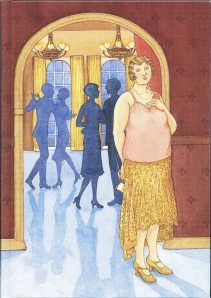 I can see those publishers’ point of view, although the darkness that strikes me is perhaps a different one than theirs. I find the heartrending despair of the naive yet nevertheless spirited narrator Aroon rather less than amusing. Debra McFarlane’s exquisite illustrations, one of which decorates the boards of the cover, perfectly depict the young lady. The family culture of denial is stifling. However, I have to admit that the writing sparkles with wit and the characters are only too credible.
I can see those publishers’ point of view, although the darkness that strikes me is perhaps a different one than theirs. I find the heartrending despair of the naive yet nevertheless spirited narrator Aroon rather less than amusing. Debra McFarlane’s exquisite illustrations, one of which decorates the boards of the cover, perfectly depict the young lady. The family culture of denial is stifling. However, I have to admit that the writing sparkles with wit and the characters are only too credible.
After this, still too early to meet the others for breakfast, I walked around the small Surrey town, spotting another Heritage plaque, this time giving us the tale of a former post office the demise of which must have been repeated throughout the land: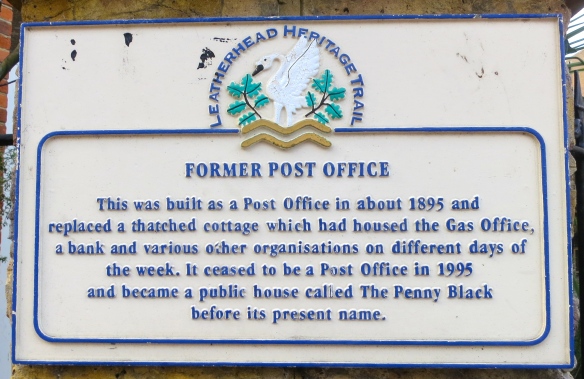
 A possibly less imaginative title is borne by The Old Post Office public house in Newark.
A possibly less imaginative title is borne by The Old Post Office public house in Newark.
Breakfast at Annie’s continued two parts of the process. The first was the encounter with Michael, a regular customer there. This is a very homely little place with just a few small tables. It offers wholesome food, and every Sabbath some of the residents of an establishment for people who are at least partially sighted attend for their Sunday roast dinner. One of these is the septuagenarian Michael. He is so politely gregarious and able to communicate with the use of his other senses, that the first time we met him we had not realised he was unable to see us. Today, Jackie and I arrived before our companions, so we had Michael to ourselves. We come but once a year, yet he does seem to remember us.
 The next part was not usually attached to Annie’s. Perhaps it was because there were eight of us, two more than usual, that two of us went short of a meal for a while. Shelly distracted herself with the ‘i’ crossword, and I entertained myself by watching the others scoffing. I won the race to be served by a short head.
The next part was not usually attached to Annie’s. Perhaps it was because there were eight of us, two more than usual, that two of us went short of a meal for a while. Shelly distracted herself with the ‘i’ crossword, and I entertained myself by watching the others scoffing. I won the race to be served by a short head.
Back home in Hampshire Helen and Bill will collect us this evening for a visit to Totton’s Fuchi restaurant, to complete a pleasant weekend. I will report on that tomorrow.
A Painting
Jackie read out a salutary item for me from BBC News this morning.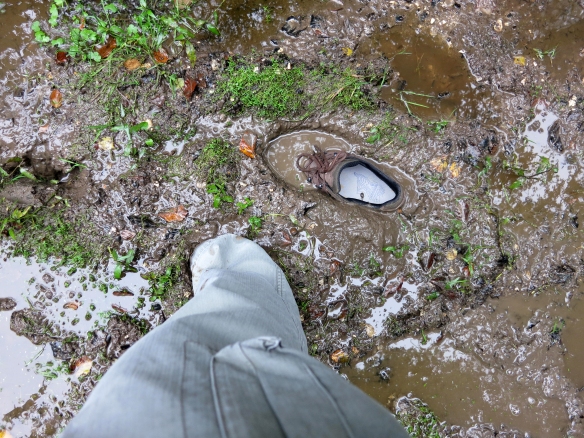 My regular followers will know of my penchant for becoming stuck in the mud. She therefore thought I should take note of the couple in their late sixties who ventured into The New Forest not far from us. Twenty firefighters using specialist equipment were employed in freeing them when they ‘found themselves stuck in a bog near Burley. They were lucky to have a mobile phone and a signal’. ‘Phone Signal Saves Couple In Bog’, was the headline.
My regular followers will know of my penchant for becoming stuck in the mud. She therefore thought I should take note of the couple in their late sixties who ventured into The New Forest not far from us. Twenty firefighters using specialist equipment were employed in freeing them when they ‘found themselves stuck in a bog near Burley. They were lucky to have a mobile phone and a signal’. ‘Phone Signal Saves Couple In Bog’, was the headline.
It was quite a pleasant morning when we set off in the hopes that the ailing car would reach Wells Garage in Ringwood. Tony, at the garage had said they were fully booked and one man short today, but we could bring the Modus in and they would do what they could. We made it to the garage, where he kept the vehicle and gave us a courtesy car.
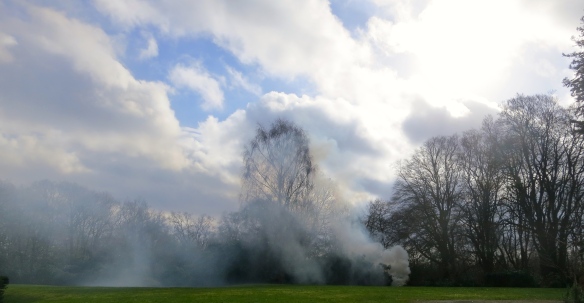
John had lit a bonfire down the slope to the south east corner of the garden. Masking the trees, the smoke from this blended well with the clouds and patches of blue sky above. It wasn’t long before the rain set in and the blue disappeared.
We spent the rest of the morning at Helen and Bill’s, where we had coffee and a good salad lunch. By the time we returned home the roads were just as water-covered as at any other time recently.
This afternoon I finished reading Margaret Forster’s absorbing novel ‘Keeping the World Away’. I have focussed before on transitional objects. In a sense, Forster uses one in her novel. Passing from one woman to another over the period of a century, in a variety of circumstances, is a presumably imagined painting by Gwen John. A number of women are involved and their lives sometimes overlap quite apart from the connection with a real work of art.
 John was essentially a portrait painter. Our author has chosen to weave her tale around a rare exception, ‘A Corner of the Artist’s Room in Paris’, of which the work carrying her story is said to be a previous version.
John was essentially a portrait painter. Our author has chosen to weave her tale around a rare exception, ‘A Corner of the Artist’s Room in Paris’, of which the work carrying her story is said to be a previous version.
The writer invites us into the minds of her characters, in particular their emotional lives, including their sexuality and their responses to Gwen John’s masterpiece. She is particularly skilled in this, as she is in story-telling. I will not reveal the ending of the book, which I would recommend for your reading pleasure, but I can say that Gwen’s childhood is the starting point. I think this version of the gestation and creation of the painting itself is probably imagined, linked as it is with the artist’s waning affair with Auguste Rodin, because it is at odds with the creator’s own comments. Nevertheless, it is credible and keeps us intrigued.
This evening we dined on Jackie’s excellent chilli con carne (recipe) with wild rice and peas. Strawberry jelly and evaporated milk was to follow. I drank some La Patrie Cahors 2012 malbec.
Perfume

As the morning stretched out, so did the shadows cast on the lawn by the climbing sun whilst we pottered about inside prior to a trip to Christchurch.
After lunch we drove to Curry’s/PC World just outside Christchurch to investigate the possibilities of buying a new laptop and giving my old one a good clean up. Yesterday I had discovered that I can exchange my NatWest Your Points for vouchers to be used in this store. I have more than enough for a Windows laptop, but nowhere near sufficient for a Mac Book. The vouchers are in the post, so I have deliberation time. The old laptop has been left for the clean. The reason I want a new one is that the old Toshiba dates from the days before built-in card readers, and I’d like to be able to simply slip the card from my camera into the device when I am not near my iMac.
We then wandered around the town. On this fine springlike day crocuses brightened the Priory car park, where we must have secured the last available parking spot.
On this fine springlike day crocuses brightened the Priory car park, where we must have secured the last available parking spot. As we left our car, the view of the Priory Church was blocked by a vehicle from which two women and a child were being decanted, so I waited until the man with them had driven off, no doubt in search of the advertised Mayors Mead, to photograph the people and the building.
As we left our car, the view of the Priory Church was blocked by a vehicle from which two women and a child were being decanted, so I waited until the man with them had driven off, no doubt in search of the advertised Mayors Mead, to photograph the people and the building.
0000000000000000000000000000
On leaving the church precinct, my attention was drawn to an ancient ruin peering above the sloping red-tiled rooftops of the town. This Jackie knew to be the castle, so we walked round to have a look at it. 
 Dazzling direct sunlight striated the sward covering the mound on which this small relic stood, so I walked further into the grounds to view the castle with the sun on its back. Whilst I was doing so, my lady appeared from behind the pile, waving her arms in delight at having ascended the steep steps to her goal. The red-legged little girl who shares the shot must have raced up and down the two sets of steps at least a dozen times before settling into the stocks to have her photograph taken in them.
Dazzling direct sunlight striated the sward covering the mound on which this small relic stood, so I walked further into the grounds to view the castle with the sun on its back. Whilst I was doing so, my lady appeared from behind the pile, waving her arms in delight at having ascended the steep steps to her goal. The red-legged little girl who shares the shot must have raced up and down the two sets of steps at least a dozen times before settling into the stocks to have her photograph taken in them.



From the top of the mound, through the vestigial castle arches, we enjoyed interesting views of the town, in particular a fascinating display of roofing through the ages.
 The town centre juxtaposes the old and the new, with many buildings, such as The New Forest Perfumery, having changed their use, no doubt on numerous occasions over the years. The Perfumery, still bearing its original sign in old script looks to be a building from the sixteenth or seventeenth century. It now houses tea rooms, as indicated by the more modern board outside. Perhaps because our house in Sigoules was built in the eighteenth century and because Patrick Suskind’s 1985 novel entitled ‘Perfume: The story of a Murderer’, is set in the France of that era, I speculated that maybe Suskind’s perfumier worked in a similar setting. The novel focusses on the sense of smell and its relationship with the emotional meaning that scents may carry. Even if the tea rooms serve a vast array of teas and coffees, I doubt that their aromas are likely to match the variety of fragrances that once permeated the fabric of the building.
The town centre juxtaposes the old and the new, with many buildings, such as The New Forest Perfumery, having changed their use, no doubt on numerous occasions over the years. The Perfumery, still bearing its original sign in old script looks to be a building from the sixteenth or seventeenth century. It now houses tea rooms, as indicated by the more modern board outside. Perhaps because our house in Sigoules was built in the eighteenth century and because Patrick Suskind’s 1985 novel entitled ‘Perfume: The story of a Murderer’, is set in the France of that era, I speculated that maybe Suskind’s perfumier worked in a similar setting. The novel focusses on the sense of smell and its relationship with the emotional meaning that scents may carry. Even if the tea rooms serve a vast array of teas and coffees, I doubt that their aromas are likely to match the variety of fragrances that once permeated the fabric of the building.

Jackie and I were immediately transported to our youth at the sight of the Regent Centre, this picture house from the brief heyday of the cinema, sandwiched between a Subway and a Poundshop. The old Regent still shows films, but is now a much broader entertainment centre. Originally opening in 1931 it operated as a cinema for just over forty years, after which it spent a decade housing Bingo. A partnership between volunteers and Christchurch Borough Council has turned it into a theatre, cinema, concert hall, studio and art gallery.  This afternoon there were a number of stalls inside, displaying jewellery, models, CDs and DVDs among other articles for sale. Tables and chairs for takers of tea lined the entrance hall. The building is well maintained, and retains its Art Deco style.
This afternoon there were a number of stalls inside, displaying jewellery, models, CDs and DVDs among other articles for sale. Tables and chairs for takers of tea lined the entrance hall. The building is well maintained, and retains its Art Deco style.
This evening we dined on mushroom omelette also containing onions, garlic, and a dash of Worcester sauce; baked gammon; fried potatoes, and baked beans. Lemon and lime jelly floating in evaporated milk was a suitable dessert. I finished the Lidl Bordeaux and Jackie saw off the zinfandel rose.
The Young Visiters (Sic)
Mat and Tess went home last night.
This morning normal family life was resumed.
After lunch Becky had us all screaming with laughter as she continued ‘The Young Visiters’ reading. For those unfamiliar with nine-year-old Daisy Ashford’s 1919 masterpiece it is highly recommended for its juvenile spelling, observation, and hilarious gleanings from adult conversation. It is regarded by many as one of the most humorous works in literature.
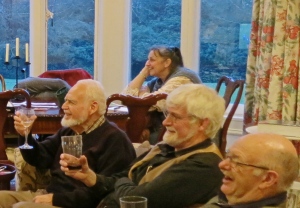 From her perusal of older blog posts our daughter recognised that Jackie’s pose in Helen’s rugbyfest photograph of 9th March was almost identical to the one in my drawing of her made in 1965.
From her perusal of older blog posts our daughter recognised that Jackie’s pose in Helen’s rugbyfest photograph of 9th March was almost identical to the one in my drawing of her made in 1965.
After I’d had an uneventful walk on this comparatively mild afternoon down to the postbox and back,  I accompanied Becky, Ian and Scooby on the Seamans Lane/Bull Lane loop. This was to be more eventful for Flo’s little dog, who was to receive his own young visiters (sic). A particularly frisky foal on the road took an interest in Ian, whose sleeve it kept nipping.
I accompanied Becky, Ian and Scooby on the Seamans Lane/Bull Lane loop. This was to be more eventful for Flo’s little dog, who was to receive his own young visiters (sic). A particularly frisky foal on the road took an interest in Ian, whose sleeve it kept nipping.  Ian sought Scooby’s protection. Scooby opted for discretion and conducted the face-off from the safety of the far side of Becky’s legs. These larger animals can really be quite frightening as they quite silently advance upon you. Small dogs obviously feel the same.
Ian sought Scooby’s protection. Scooby opted for discretion and conducted the face-off from the safety of the far side of Becky’s legs. These larger animals can really be quite frightening as they quite silently advance upon you. Small dogs obviously feel the same.
Earlier, a much larger puppy had rushed out of its garden and attempted to frolic with Scooby, who gave the younger creature a piece of his mind. This was administered with a suitable amount of heroic yapping and snarling. The puppy’s owner had explained that the reason their gate was open was that it was electrically operated and there had been so many power cuts recently they had disconnected it for fear of being unable to get out if the power went down when it was closed. With the pony our hero remained as quiet as that particular young visiter.
Our dinner this evening was the symphony in white and cream. Rose and red wines and elderflower cordial were the accompanying drinks.
We are now about to settle down to watch The Matrix on TV.




















